In high-performance computing (HPC), breaking records in calculating mathematical constants represents a triumph of mathematical endeavor and a testament to the advancements in hardware technology. In the StorageReview lab, Kevin and Jordan recently achieved a remarkable feat: calculating the Golden Ratio to 20 trillion digits, the Square Root of 2 to 20 trillion digits, Gamma(1/3) to 1 Trillion digits, and Zeta(5) to over 201 billion digits.
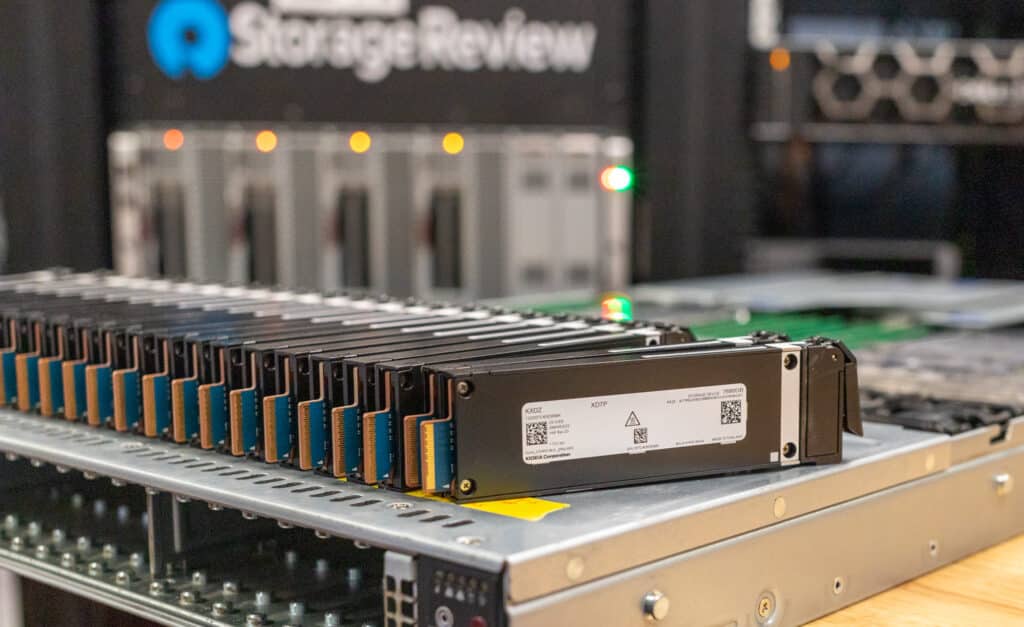
This accomplishment was made possible by leveraging a combination of 24 KIOXIA 7.68TB XD7P Series Data Center NVMe SSDs within a Supermicro Storage SuperServer SSG-121E-NES24R, equipped with dual Intel Xeon Platinum 8450H processors and 512GB of RAM.
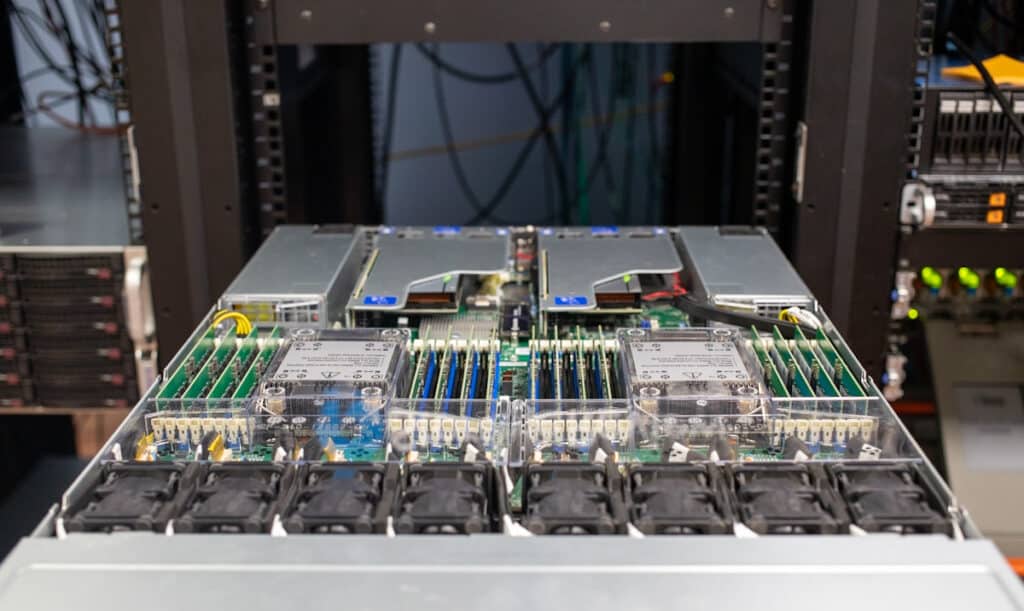
Mathematical Milestones and Their Significance
Zeta(5), a value of the Riemann Zeta function at 5 is significant in number theory and complex analysis. The Riemann Zeta function, central to the distribution of prime numbers, explores deep connections within different areas of mathematics. Zeta(5) specifically, like other odd integer values of the Zeta function, remains shrouded in mystery; its exact value is unknown, and it’s believed to be an irrational number, where the decimal continues forever.
The test covering Zeta(5) had a previous record of 200,000,000,100 which required 39.3 hours of compute time, which we were able to beat with 201,000,001,300 in only 29.9 hours.
The Golden Ratio, Square Root of 2, and Gamma(1/3) are fundamental mathematical constants with deep implications across various fields. The Golden Ratio, often denoted by the Greek letter Phi, is a number approximately equal to 1.618033988749895, known for its unique and aesthetically pleasing properties in art, architecture, and nature. The previous Golden Ratio record held was for 10T which took 14.3 days to compute. We were able to double that figure in just 30 hours.
| Date Announced | Constant: | Decimal Digits: | Time: |
| December 10, 2023 | Zeta(5) | 201,000,001,300 | Compute: 29.9 hours |
| December 2, 2023 | Golden Ratio | 20,000,000,000,000 | Compute: 76.1 hours |
| November 17, 2023 | Square Root of 2 | 20,000,000,000,000 | Compute: 29.2 hours |
| December 13, 2023 | Gamma(1/3) | 1,000,000,000,000 | Computer: 16.9 hours |
The Square Root of 2, approximately 1.4142135623730951, is a crucial constant in geometry, representing the length of the diagonal of a square with sides of one unit. It is an irrational number that forms the basis for Pythagorean theorem applications. The previous record hit 10,000,000,001,000 in just over 18 days, while we effectively doubled that result in just 29.2 hours.
Gamma(1/3), part of the Gamma function, which generalizes the factorial function to complex and real number arguments, is significant in various areas of mathematics and physics, including probability theory and complex analysis.
Each of these constants holds a special place in both theoretical and applied mathematics, symbolizing the beauty and complexity of mathematical exploration.
y-cruncher and Swap Space Utilization
For this testing we utilized y-cruncher, a program designed specifically for computing mathematical constants to high precision. One of y-cruncher’s key features is its efficient use of SSDs as swap space. Swap space is a form of virtual memory that extends the RAM by allowing data to be temporarily written to and read from the SSDs.
This capability is crucial when dealing with computations exceeding the available physical memory, as in our project. For example, y-cruncher reports needing nearly 75TB of swap space on the drives to be able to complete a 20 Trillion digit computation.
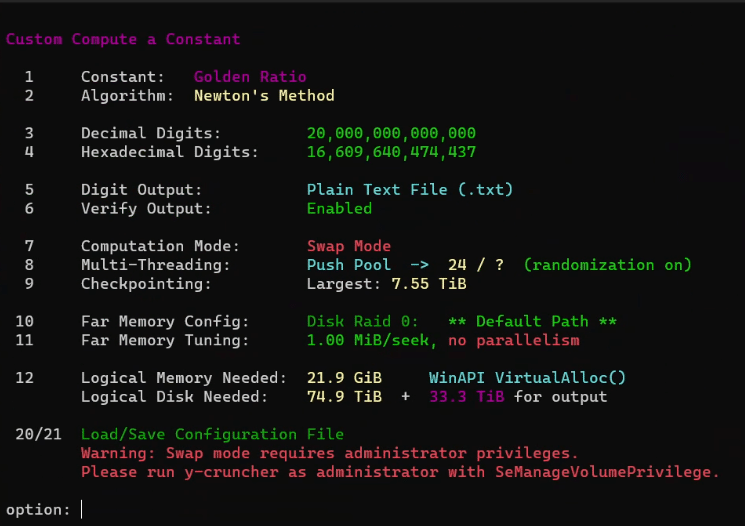
y-cruncher asking for 75TB of swap space to calculate 20 Trillion Digits
The high density of the KIOXIA SSDs meant that more data could be stored in the same physical space, an essential factor given the size of these computations far exceeds the DRAM capacity. Even more impressively, we did this in a 1U “pizza box” server format. This density allowed us to maintain a compact server footprint while achieving the computational power needed for our record-breaking calculations.
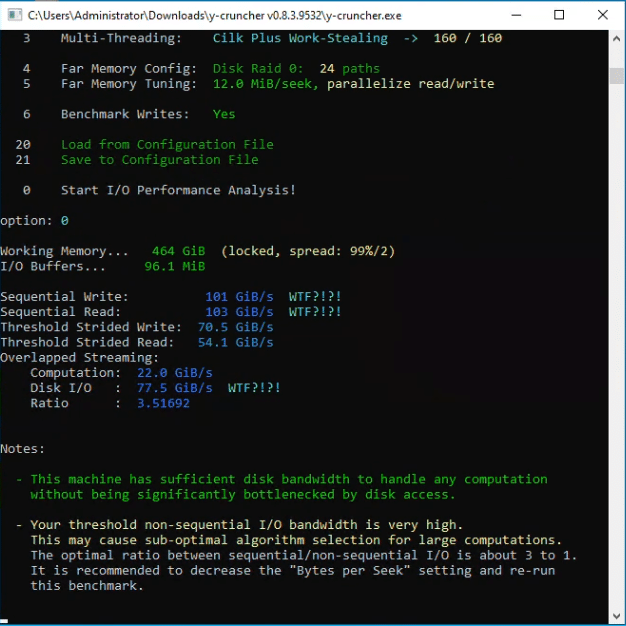
When utilized as swap space in our y-cruncher computations, the speed of these KIOXIA SSDs was a huge leg up in the race. When RAM is insufficient, y-cruncher relies on swap space to temporarily store data. The high-speed read and write capabilities of the KIOXIA XD7P Series SSDs, combined with recent y-cruncher SSD optimizations, significantly reduced the latency usually associated with swap operations, thereby maintaining the efficiency of the calculation process.
Beyond speed, the endurance and reliability of SSDs are paramount, especially in long-duration computational tasks. The KIOXIA XD7P SSDs are designed to withstand prolonged intense workloads, ensuring consistent performance throughout the calculation of these mathematical constants. Their durability means fewer concerns about data loss or degradation in performance over time, which is critical in high-stakes computing environments. After computing over 80 trillion total digits (once for the record, a second time for confirmation on each constant), the SSDs showed no signs of drive degradation and still reflected 100 percent health status.
Conclusion
Our achievement in calculating these world-record length constants underscores the importance of high-quality hardware in the field of HPC.
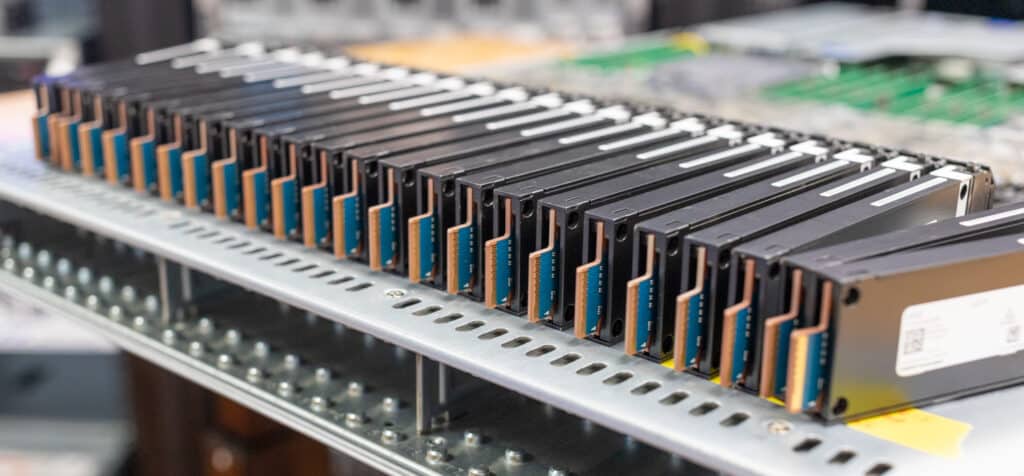
The KIOXIA XD7P Series Data Center NVMe SSDs proved reliable, offering the density and speed necessary for such demanding tasks. Coupled with the Supermicro Storage SuperServer SSG-121E-NES24R, our setup balances cutting-edge hardware and rigorous computational software like y-cruncher. This milestone advances the frontiers of mathematical computation and showcases the remarkable capabilities of contemporary HPC hardware.




 Amazon
Amazon